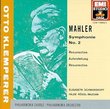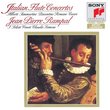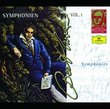| All Artists: Ludwig van Beethoven, René Leibowitz, Royal Philharmonic Orchestra, Inge Borkh, Richard Lewis Title: Beethoven: Symphony No. 9 Members Wishing: 0 Total Copies: 0 Label: Chesky Records Release Date: 6/23/1994 Genre: Classical Styles: Historical Periods, Classical (c.1770-1830), Modern, 20th, & 21st Century, Symphonies Number of Discs: 1 SwapaCD Credits: 1 UPC: 090368006622 |
Search - Ludwig van Beethoven, René Leibowitz, Royal Philharmonic Orchestra :: Beethoven: Symphony No. 9
 | Ludwig van Beethoven, René Leibowitz, Royal Philharmonic Orchestra Beethoven: Symphony No. 9 Genre: Classical
|
Larger Image |
CD DetailsSimilarly Requested CDs |
CD ReviewsUnmatched inertia, but 5 star rating is conditional Erik H. Larson (thefearlessleader@n | Tuscaloosa, Alabama | 03/26/1999 (5 out of 5 stars) "The performers heard on this recording create a presentation of the 9th Symphony quite unlike any other I am familiar with (I own 11 different recordings of the 9th, and am well acquainted with at least 5 others). Those used to late 20th century interpretations of this work will hear the first three movements' tempos as rather brisk. The raucousness of the horns in the 2nd movement - which I personally find very thrilling - may be viewed as crass and in poor taste by some. But it is the 4th movement of this recording that is what makes it so remarkable. A word of warning: the solo quartet sounds very much like a product of the earlier part of this century. Grand, powerful singing, but vibrato wide enough to drive a truck through. The soprano is especially guilty of this. If you are prepared to accept this, however, the 4th movement unfolds with a tidal wave of inertia unmatched by any other performance that I have ever heard, whether live or recorded. The conductor moves through the introductory recitativo passages quickly - so quickly in fact that the arrival of the movement's theme and variations section comes almost as a surprise. Leibowitz takes a no-nonsense approach to the theme, and by the time all of the instruments have joined in, the Royal Philharmonic is demonstrating the unique sound that was so indigenous to this ensemble in the 1960's. The solo quartet has already been mentioned, and so I will confine the majority of my comments now to the choir. From the very first "Freude!" it is clear that the Beecham Choral Society is at least a match for a large, professional orchestra like the RPO. One rarely struggles to hear the choir, unlike so many other recordings currently on the market. This is a large chorus that has been well miked and which sings agressively throughout the entire movement. The alto and tenor sections are the biggest surprise here. Of the four sections, they consistantly demonstrate the most agressive characteristics. A fine tenor solo is heard in the march section, with the soloist displaying an impressive combination of tone and projection. The choir's double fugue is nothing short of glorious - simply the finest I've heard. The alto section (which includes a number of counter tenors) is in part responsible this section's striking impact. The movement thunders ahead to an unusually SLOW closing prestissimo. Yet, this final section is tremendously effective. Bass drum and timpani rumble assertively. The British tenors demonstrate that they can shout with the best German choirs, yet still produce some semblance of tone. And the horn section, lying mostly dormant since the second movement, reasserts itself in the closing bars. Of those 11 recordings of Beethoven's 9th symphony that I own, this one is unquestionably my favorite. Champions of early music groups and period practice would probably be aghast by the "excesses" of this recording. But I believe that it is profoundly successful in capturing the spirit of the composer, and the spirit of his work. Beethoven would have approved." A Leibowitz original Erik H. Larson (thefearlessleader@n | 07/19/2000 (5 out of 5 stars) "Well, I have to agree with just about everything the previous reviewer found...and I'm thrilled I'm not the only one who hears the greatness of these proceedings. It's been a cry in the wilderness.I do think the quartet is shakey, too, but the attention to the text it has is extraordinary and Leibowitz has found every compositional watershed the great work contains. We often forget what a thrilling maestro Leibowitz was, and his artistic integrity. I have loved his complete Beethoven cycle as well as all his modern music recordings for many years.If Leibowitz has a partner in crime, it would be Antal Dorati with the same orchestra in far less-good condition. Dorati has the virtue of a more solid and equally textual quartet, superb sound from Mercury, and an euqally outstanding chorus. Sometimes I like Dorati, sometimes I like Leibowitz in this kind of performance. I just keep them both in my collection.So this is a five-star item, not for the Music Appreciaiton 101 crowd, but for listeners like me who can get jaded from too many Lenny-type "occasion" performances of the Ninth. Leibowitz should be among everyone's prize holdings." A magnificant achievement... Randall J. Wetmore | Wall, NJ United States | 12/20/2000 (5 out of 5 stars) "The great, often underrated or unknown, Rene Leibowitz leads perhaps the most compelling performance of Beethoven's great 9th symphony I have ever heard. His approach is direct, no nonsense, "in your face" if you will. There is a soulistic exileration that is really beyond all words or praise. The first movement is brisk but still has the all the subtleties and power this movement commmands. The middle movement climax is stunning in it's authority and grandur. The second movement has all the timpani/roll-kicking action one could ask for. The added horns are thrilling, and there are trumpet "snaps" that initiate the retransition in the trio that would startle no matter how well one is familiar with this movement. The third movement, while briskly taken, has a rich and beautiful emotional tone to it that is stunningly heart warming for the fast tempo or any tempo for that matter. Leibowitz is the only one I have heard who successfully pulls off a "brisk-slow movement." The fourh movement begins with blazing speed, trumpets blaring as if a war march of troops are threatning to destroy the symphony and mankind's triumph. The previous movement themes are impatiently discarded, and the ode to joy melody begins brisky. When the violins enter, the Royal PHil has the most beautifut tone, and when the theme is taken by the full orchestra the trumpets are breathtaking in their majesty. The bass soloist is often criticized because he doesn't give a huge "blast" of sound that most seem to employ, but his German warmth of tone an attitude is unequalled. The female soloists are both beautiful and sing warmly and thrillingly throughout. The Beecham Choral Society matches the Royal Phil at every turn, singing with stunning clarity. Richard Lewis's "Froh, Froh" solo is absolutely for the ages. The way Leibowitz gets him to sing those words is one of the most stunningly sensational things I have ever heard. Every ounce of Lewis's heart and soul is in that passage. This simply has to be heard to be believed. Total exileration and then some! One of the most magnificant vocal passages on all records. The rest of the movement has tremendous drive, horns rising above the orchestra in thrilling fashion. The final prestissimo has an unbelievable amount of energy and ferocity, but always superbly controlled by Leibowitz. The trumpets that sweep away the finale are thrilling beyond belief. Heard live this performance would send the audience staggering from the hall. MAGNIFICANT!"
|

 Track Listings (4) - Disc #1
Track Listings (4) - Disc #1





